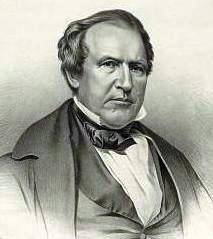Andrew Jackson Donelson
Andrew Jackson Donelson was born on August 25, 1799, in Nashville, Tennessee, to Samuel and Mary Donelson. His father died around 1804, and his mother remarried soon afterward. He grew up in Davidson County, Tennessee, in the household of his uncle Andrew Jackson. He attended Cumberland College before enrolling at the United States Military Academy. He graduated second in his class in 1820 and spent the next two years serving as aide-de-camp to Andrew Jackson in his campaign against the Seminoles.
He attended Transylvania University after leaving the army, and in the mid-1820s, he began practicing law in Nashville. He married Emily Donelson on September 16, 1824, and they had at least four children: Andrew, born around 1826; Mary, born around 1829; John, born around 1833; Rachel, born around 1834. He supported the Democratic Party, and he served as Jackson’s private secretary during his presidency.
His wife died in December 1836, and he married Elizabeth Martin several years later. They had at least four children: Daniel, born on December 2, 1842; Martin, born on June 26, 1847; Alexander, born on January 18, 1849; and Catherine, born on February 25, 1850. He returned to Nashville after his uncle’s presidency, and he became a leader in Tennessee’s Democratic Party. In the 1840s, he served as chargé d’affaires to the Republic of Texas and minister to Prussia.
He joined the Know Nothing Party in the 1850s, and he was the party’s vice presidential nominee in 1856. He moved to Memphis, Tennessee, in 1858, and he served as a delegate to the Constitutional Union Party’s national convention. He opposed secession, and he predicted that the “Rebellion would be the overthrow of Slavery on the american continent.” In May 1861, he declared that he was “still true to the flag I followed in my youth and which I still honor and revere.” Nonetheless, two of his sons served in the Confederate army.
In August 1862, he criticized Confederate president Jefferson Davis and declared the war unnecessary. Confederates arrested him on charges of sedition, but he was ultimately released. When Abraham Lincoln announced his amnesty and Reconstruction plan in December 1863, Donelson announced that he would swear the loyalty oath to the Union. In December 1865, he wrote that the Union had “incalculable importance.” Without the Union, he explained, “our independence and liberty would never have been achieved, without union they can never be maintained.”
During Reconstruction, he supported Tennessee’s Conservative Party, and he served as vice president of the party’s 1867 state convention. He died in Memphis on June 26, 1871.
Image: Andrew J. Donelson (courtesy Wikicommons)
DATABASE CONTENT
| (4131) | Donelson, Andrew Jackson | 1799-08-25 | 1871-06-26 |
- Conflict Side: Union
- Role: Civilian
- Rank in:
- Rank out:
- Rank highest:
- Gender: Male
- Race: White
Documents - Records: 8
- (10878) [recipient] ~ Daniel S. Donelson to Andrew J. Donelson, 10 October 1863
- (11511) [recipient] ~ Daniel S. Donelson to Andrew J. Donelson, 30 January 1862
- (11513) [recipient] ~ Daniel S. Donelson to Andrew J. Donelson, 16 February 1862
- (11516) [recipient] ~ Daniel S. Donelson to Andrew J. Donelson, 7 March 1862
- (11528) [recipient] ~ Daniel S. Donelson to Andrew J. Donelson, 11 December 1862
- (11531) [recipient] ~ Daniel S. Donelson to Andrew J. Donelson, 4 July 1863
- (11532) [recipient] ~ Daniel S. Donelson to Andrew J. Donelson, 6 July 1863
- (11546) [recipient] ~ Daniel S. Donelson to Andrew J. Donelson, 12 November 1863
People - Records: 2
Places - Records: 2
Groups - Records: 3
SOURCES
1850, 1860, and 1870 United States Federal Censuses, available from Ancestry.com; Tennessee Marriage Records, 1780-2002, available from Ancestry.com; “Andrew Jackson Donelson,” Wikipedia profile, available from https://en.wikipedia.org/wiki/Andrew_Jackson_Donelson; Richard Douglas Spence, Andrew Jackson Donelson: Jacksonian and Unionist (Nashville, TN: Vanderbilt University Press, 2017)





